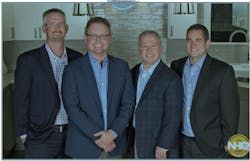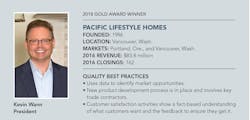Lessons Learned: Pacific Lifestyle Homes 2018 NHQ Gold
A culture of continuous improvement probably should not tolerate finger-pointing. Yet establishing that kind of corporate milieu is more easily said than done, particularly in home building, where a project has a thousand parts assembled by hired hands from dozens of outside companies. Miscommunication and mistakes are inevitable.
When there’s a variance on a Pacific Lifestyle Homes job that exceeds $500, a member of the management team sends an email to the entire company to start the discussion about what happened, how much it cost the company, and what can be done to prevent a repeat. The error could be the result of a miscalculation in estimating initial costs or an oversight in the field caused by an inadequately defined scope of work.
The exercise is called Lessons Learned. It’s the builder’s way of highlighting mistakes for all employees, not for the purpose of reprimanding, but so that everyone can learn and avoid the mistake in the future through improved planning, purchasing, contracts—whatever it takes. The criticism is constructive, and the practice is having the desired effect. Employees have been overheard talking about not becoming the inspiration of a Lessons Learned topic. NHQ judges wrote in their site visit report that the builder’s core values of candor and humility are both impressive and unique.
“If we didn’t have individuals who truly operate with the core values of accountability and humility, we wouldn’t be able to get this type of constructive information out to the entire team,” Wann says. “As an organization, we’re saying that it’s OK to make a mistake, but let’s learn from it and improve.”
Course Correction
Pacific Lifestyle Homes won Gold with its first-ever NHQ application, but it had been laying the quality management groundwork since the Great Recession and emerging from Chapter 11 protection from creditors in 2010. At the peak of the housing construction boom, Pacific Lifestyle sold more than 250 houses annually and generated more than $95 million in revenue. During the crash, the builder cut its payroll from 115 employees down to the teens, while annual sales fell to about $40 million as closings sank far below 100 houses.
Pacific Lifestyle began strategic planning then, with the entire company analyzing industry trends, as well as analyzing the builder’s strengths, weaknesses, opportunities, and threats—an exercise that takes place every year. Senior managers then spend two to three days off-site honing those findings into a one-page strategic plan that covers five-year, one-year, and quarterly goals, which the company calls BHAGS (Big Hairy Audacious Goals), and five-year, one-year, and quarterly strategies.
Coming out of the recession, the builder adopted strategies to reduce risk, such as partnering with developers to deliver finished lots, cutting company debt by using customer financing to fund construction, and diversifying the customer base by building custom homes on scattered lots. Going into strategic planning for 2017, the company brainstormed taking on challenges with lot availability, the cost of land, the tight supply of trades, and properly managing cash flow and financing.
One of the BHAGS set for this year was winning NHQ Gold. “We had long-term five- and 10-year BHAGs, but we really wanted to have an immediate, tangible activity that everyone on the team could get behind. We learned about this award through our customer satisfaction consultant, Woodland, O’Brien & Scott, and knew this lofty goal would be challenging to every part of our business,” Wann says.
In preparing the NHQ entry, senior managers found that many of their best practices weren’t documented and were only alive because of the tenure of some managers and employees. They also discovered that assumptions about some processes being performed well were wrong and needed to be tightened up, with improvements such as more thorough jobsite checklists and better process mapping.
Individual Accountability
Another company strength noted by judges was Pacific Lifestyle’s team environment and how employees are very much aware of how individual contributions influence the company’s success. Initially, key performance indicators (KPIs)—metrics that companies use to evaluate the success of reaching targets for individual tasks and major strategies—were applied only to the leadership team. Now Pacific Lifestyle applies KPIs to all of its employees, and everyone is held accountable for their performance goals by reporting actual results versus established goals to their managers or groups during weekly and monthly meetings. These sessions are when employees can help with possible solutions for a coworker who is falling short of his or her goal.
“In some cases, the individual doesn’t have complete control of their KPI,” Wann says. “This has created a culture of accountability, as each team member has to count on someone else to help them hit their goal. In some companies, this would cause finger-pointing, but we find it has improved performance and teamwork among our group.”
Progress with major KPIs—such as raising the “would recommend” rating on customer surveys from last year’s 93 percent—are visually shown on color-coded whiteboards posted throughout the office. Individual KPIs are tracked on a spreadsheet and regularly reviewed by managers. This year the completion of individual and company goals was moved from a quarterly basis to a trimester to allow more time to develop and execute the right strategies. The builder provides recognition for individuals who attain their goals and, starting this year, KPI performance is tied to profit sharing.
Listening to the Customer's Voice
Another best practice that impressed the NHQ judges was the company’s focus and enthusiasm for a strong buyer experience and a well-built product. Among the tools Pacific Lifestyle uses to have everyone rowing in the same direction was creating a custom survey this year that, in addition to collecting typical demographic information, asked prospects about why they are buying a home, their design preferences, and some queries intended to tease out how a previous homebuying experience may be influencing the client’s current search. The results helped Pacific Lifestyle gauge whether and where customer expectations are misaligned with what the company can deliver. CallRail call-tracking software enables managers to review telephone conversations between sales agents and customers for training and coaching. The software also tracks the percentage of calls that are answered, response turnaround time, and other metrics that can be tracked by individual agent and by advertisement.
Customer satisfaction surveys from Woodland, O’Brien & Scott are reviewed weekly by managers and at monthly customer service meetings with the warranty team. Managers reach out to customers regarding any negative feedback to resolve problems and to find ways to prevent miscues from repeating. Managers also meet with the customer experience consultant twice a year to get assistance with establishing priorities for improving the customer experience and to compare Pacific Lifestyle with the industry’s best performers.
The builder also meets quarterly to review customer feedback regarding selection options to consider which ones should be adjusted or included, and which products should be dropped.
The builder added the position of relationship manager, a role with the sole purpose of keeping buyers informed throughout the building process. The relationship manager meets customers at pre-construction and stays engaged with them through to closing. Since this post was created, Pacific Lifestyles’ communication scores have improved and the number of unforeseen customer issues has decreased. The builder also created a customer expectation video that is shown to buyers during the pre-construction meeting, in addition to a PowerPoint presentation for new-home orientation. Going even further to create a memorable experience, buyers are greeted at move-in with a large “Welcome Home” sign, a gift basket, and slippers to wear around the house.
“The judges asked tough questions and didn’t settle for vague answers. We realized that they weren’t concerned about what we were planning to do, only what we have done and whether it was a regular part of our business,” Wann says.



